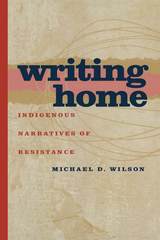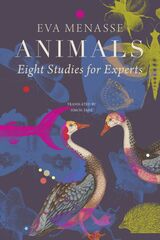2 books about Indigenous Narratives

Indigenous Narratives of Territory and Creation
Hemispheric Perspectives
Penelope Kelsey and Leila Gómez, special issue editors
Duke University Press, 2020
Indigenous activism in the Americas has long focused on the symbolic reclamation of land. Drawing on interdisciplinary perspectives, contributors to this issue explore narratives of territory and origin that provide a foundation for this political practice. The contributors study Indigenous-language stories from displaced communities, analyzing the meaning and power of these narratives in the context of diaspora and the struggle for land. Essays address topics including territorial struggle and environmentalism, Indigenous resistance to neoliberal policies of land dispossession, and alliances between academic and Indigenous knowledges and activisms. This issue brings together fruitful comparisons of theoretical frameworks and case studies in Indigenous studies across North and South America. Its contributors advance the process of returning to Indigenous knowledge, offering essential alternatives to Western epistemologies.
Contributors. Amber Meadow Adams, Alexandre Belmonte, Enrique Manuel Bernales Albites, Andrew Cowell, Ella Deloria, Leila Gómez, Sarah Hernandez, Penelope Kelsey, José Antonio Mazzotti, Javier Muñoz-Díaz, Craig Perez, Cheryl Savageau, Ángel Tuninetti, Christopher T. Vecsey
Contributors. Amber Meadow Adams, Alexandre Belmonte, Enrique Manuel Bernales Albites, Andrew Cowell, Ella Deloria, Leila Gómez, Sarah Hernandez, Penelope Kelsey, José Antonio Mazzotti, Javier Muñoz-Díaz, Craig Perez, Cheryl Savageau, Ángel Tuninetti, Christopher T. Vecsey
[more]

Writing Home
Indigenous Narratives of Resistance
Michael D. Wilson
Michigan State University Press, 2008
In Writing Home, Michael Wilson demonstrates that the use of acceptable Western literary forms by indigenous peoples, while sometimes effective, has frequently distorted essential truths about their cultures. Sermons, for instance, have provided some indigenous authors with a means to criticize colonialism; but ultimately this institutional form, by its very nature, expresses a hierarchical relationship between Christian religions and indigenous beliefs and practices. Similarly, autobiographies are useful vehicles for explaining the cultural practices of a particular tribal group—or personalizing the destructive forces of colonialism—yet the autobiographical form itself suggests an ethos of individualism entirely contrary to a vision of communal identity central to many indigenous groups. Short fiction and novels are often built around conflict. Although indigenous writers have used this thematic approach with considerable artistry to express the clash between indigenous societies and the forces of colonialism, for many indigenous people the idea of conflict as the basis of cultural expression may be antithetical to a relational, perhaps familial, attitude toward the world and other people.
Writing Home explores the ways that indigenous writers use ideas and structures from primarily oral traditions to resist, for example, colonial metanarratives that legitimize and even demand the disappearance of indigenous peoples—Manifest Destiny, Social Darwinism, and the inevitable plight of the tragic "mixed blood." To this end, Wilson examines selected works by Mourning Dove (Humishuma), Leslie Marmon Silko, Gerald Vizenor, Louise Erdrich, and Ray Young Bear. In the effort to create a mimetic form of representation that is appropriate to their cultures, these writers, Wilson finds, confront issues of authenticity, identity, and society. Ultimately, Wilson’s investigation reminds us of the difficulty and ingenuity required to rescue an authentic written representation of a culture from the distortions caused by the colonialist’s "accepted" representational structures.
[more]
READERS
Browse our collection.
PUBLISHERS
See BiblioVault's publisher services.
STUDENT SERVICES
Files for college accessibility offices.
UChicago Accessibility Resources
home | accessibility | search | about | contact us
BiblioVault ® 2001 - 2024
The University of Chicago Press









